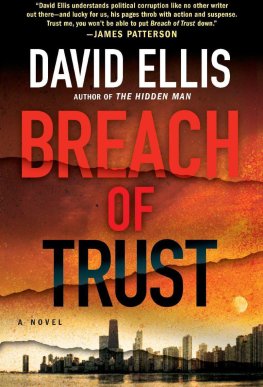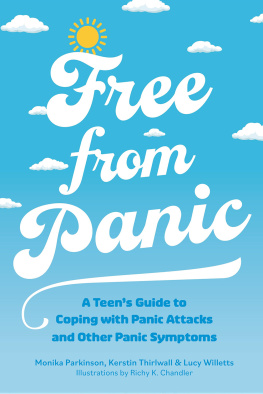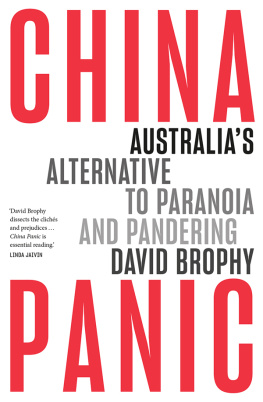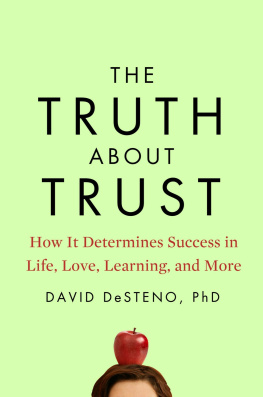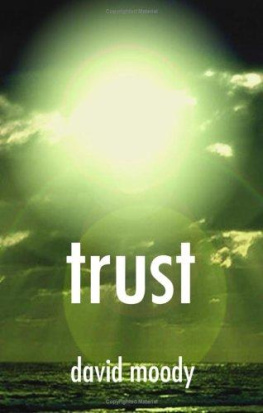David Wessel - In Fed we trust: Ben Bernankes war on the great panic
Here you can read online David Wessel - In Fed we trust: Ben Bernankes war on the great panic full text of the book (entire story) in english for free. Download pdf and epub, get meaning, cover and reviews about this ebook. year: 2009, publisher: Crown Business, genre: Science. Description of the work, (preface) as well as reviews are available. Best literature library LitArk.com created for fans of good reading and offers a wide selection of genres:
Romance novel
Science fiction
Adventure
Detective
Science
History
Home and family
Prose
Art
Politics
Computer
Non-fiction
Religion
Business
Children
Humor
Choose a favorite category and find really read worthwhile books. Enjoy immersion in the world of imagination, feel the emotions of the characters or learn something new for yourself, make an fascinating discovery.

- Book:In Fed we trust: Ben Bernankes war on the great panic
- Author:
- Publisher:Crown Business
- Genre:
- Year:2009
- Rating:3 / 5
- Favourites:Add to favourites
- Your mark:
- 60
- 1
- 2
- 3
- 4
- 5
In Fed we trust: Ben Bernankes war on the great panic: summary, description and annotation
We offer to read an annotation, description, summary or preface (depends on what the author of the book "In Fed we trust: Ben Bernankes war on the great panic" wrote himself). If you haven't found the necessary information about the book — write in the comments, we will try to find it.
David Wessel: author's other books
Who wrote In Fed we trust: Ben Bernankes war on the great panic? Find out the surname, the name of the author of the book and a list of all author's works by series.
In Fed we trust: Ben Bernankes war on the great panic — read online for free the complete book (whole text) full work
Below is the text of the book, divided by pages. System saving the place of the last page read, allows you to conveniently read the book "In Fed we trust: Ben Bernankes war on the great panic" online for free, without having to search again every time where you left off. Put a bookmark, and you can go to the page where you finished reading at any time.
Font size:
Interval:
Bookmark:
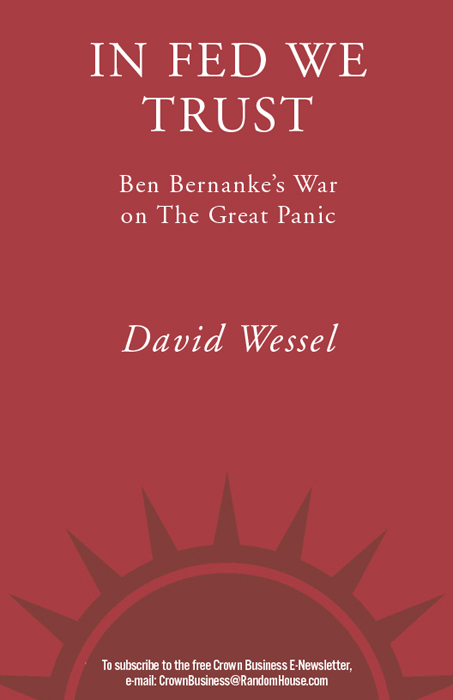
Prosperity: The Coming 20-Year Boom and What It Means for You
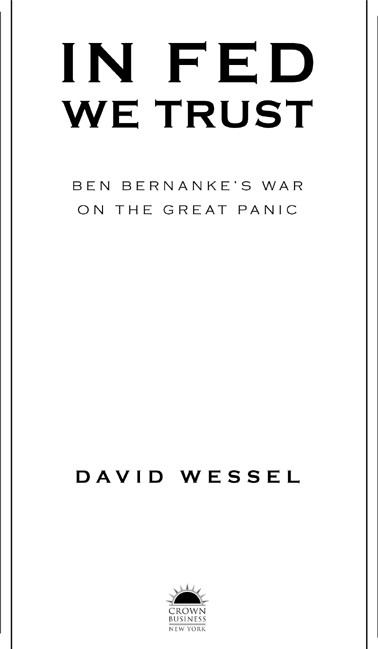
To Morris and Irm Wessel, my parents,
who showed me the way

Chapter 1: L ET O L L EHMAN G O
The pivotal weekend ofSeptember 12-14, 2008
Chapter 2: P ERIODICAL F INANCIAL D EBAUCHES
The long-forgotten history of the Fed
Chapter 3: A GE OF D ELUSION
What Greenspan wrought
Chapter 4: T HERE A RE J EWS IN B OSTON , T OO
Who is Ben Bernanke?
Chapter 5: P AS DE D EUX
The Great Panic begins in August 2007
Chapter 6: T HE F OUR M USKETEERS : B ERNANKES B RAIN T RUST
Bernanke, Kohn, Warsh, and Geithner
Chapter 7: RE: RE: RE: RE: RE: RE: B LUE S KY
The Feds first response to the Great Panic
Chapter 8: R UNNING FROM B EHIND
How the Fed got behind the curve, and how it caught up
Chapter 9: U NUSUAL AND E XIGENT
Bear Stearns, the first rescue
Chapter 10: F ANNIE , F REDDIE, AND F EDDIE
Taking over Freddie Mac and Fannie Mae, and pondering next steps
Chapter 11: B REAKING THE G LASS
The fallout from Lehman and AIG andgoing to Congressfinally
Chapter 12: S OCIALISM WITH A MERICAN C HARACTERISTICS
Forcing taxpayer capital on the banks
Chapter 13: W ORLD OF ZIRP
The Fed gets rates to zero
Chapter 14: D ID BERNANKE K EEP H IS P ROMISE TO M ILTON F RIEDMAN?
The early verdict

I N THE G OVERNMENT
BEN BERNANKE
Chairman, Federal Reserve Board (2006 )
DONALD KOHN
Vice Chairman, Federal Reserve Board (2006 )
Member, Federal Reserve Board (2002 2006)
KEVIN WARSH
Member, Federal Reserve Board (2006 )
TIMOTHY GEITHNER
Secretary of the Treasury (2009 )
President, Federal Reserve Bank of New York (2003 2009)
HENRY PAULSON
Secretary of the Treasury (2006 2009)
ALAN GREENSPAN
Chairman, Federal Reserve Board (1987 2006)
LAWRENCE SUMMERS
Director, White House National Economic Council (2009 )
I N THE P RIVATE S ECTOR
JAMES DIMON
Chief Executive, JPMorgan Chase (2005 )
RICHARD FULD
Chief Executive, Lehman Brothers (1994 2008)
KENNETH LEWIS
Chief Executive, Bank of America (2001 )
VIKRAM PANDIT ,
Chief Executive, Citigroup (2007 ) CHARLES PRINCE
Chief Executive, Citigroup (2003 2007)
ALAN SCHWARTZ
Chief Executive, Bear Stearns (2008)
President or Copresident (2001 2008)

A t the beginning of October 2008, after some of the toughest weeks of the Great Panic, the lines in Ben Bernankes face and the circles under his eyes offered evidence of more than a year of seven-day weeks and conference calls that stretched past midnight. Sometimes all that seemed to keep Bernanke going was the constantly restocked bowl of trail mix that sat on his secretarys desk and the cans of diet Dr Pepper from the refrigerator in his office. But the balding, bearded chairman of the Federal Reserve managed a smile as he confided that he had a title for the book he would write someday about his watch as helmsman of the world economy: Before Asia Opens
The phrase was a reference to the series of precedent-shattering decisions that Bernanke and others at the Fed and Treasury had been forced to make with insufficient sleep and inadequate preparation on Sundays so they could be announced before financial markets opened Monday morning in Asia, half a day ahead of Washington and New York.
Before Asia Opens was not a laugh line. The subprime mortgage mess was made in America, and that meant the U.S. government was forced to lead the cleanup. Ben Bernanke had more immediate power to do that than any other individual. The president of the United States can respond instantly to a missile attack with real bullets; he cannot respond instantly to financial panic with real money without the prior approval of Congress. But Bernanke could and did.
Yet the United States had become so dependent on the flow of money from abroad and the business of American financial institutions was so intertwined with those overseas that Bernanke didnt have the luxury of waiting until the sun rose over Washington to make decisions and pronouncements. Hence the subject line Goldman Sachs economists put on one of their weekly e-mails: Sunday is the new Monday.
There was the Sunday in March 2008 when the Federal Reserve shattered seventy years of tradition and lent $30 billion to induce JPMorgan Chase to buy Bear Stearns, a flailing investment bank the Fed neither regulated nor officially protected.
And the Sunday in August 2008 when Bernanke and Treasury Secretary Henry Paulson, the nations self-appointed investment banker in chief, decided to seize Fannie Mae and Freddie Mac, the government-sponsored, shareholder-owned mortgage giants that had borrowed heavily from abroad.
And the Sunday in late September 2008 when Bernanke and his Wall Street field marshal, Timothy Geithner, then president of the Federal Reserve Bank of New York, pressured the Federal Deposit Insurance Corporation to invoke an emergency law to subsidize Citigroups attempt to strengthen itself by acquiring Wachovia.
Yet no Sunday of the Great Panic would prove as consequential and controversial as September 14, 2008, the day Bernanke, Geithner, and Paulson allowed Lehman Brothers to fail after a desperate search for someone to buy it.
The government-sanctioned bankruptcy of a Wall Street firm founded before the Civil War marked a new phase in the Great Panic, a moment when financial markets went from bad to awful. The Wall Street Journal dubbed it the Weekend That Wall Street Died. Lehmans bankruptcy was the largest in U.S. history. The financial market reaction was ugly. At the end of trading on Monday, the Dow had plummeted over 500 points, its biggest one-day drop since September 17, 2001, when trading resumed following the 9/11 attacks. While financial giants led the way down Goldman Sachs stock lost 19 percent, Citigroup 15 percent every major sector on the S&P 500 index posted a loss. Other economic indicators were also negative: in anticipation of a global slowdown, oil prices plunged, while spooked investors sent the price of supersafe Treasury bills soaring. In a sign of what was coming, dozens of traders crowded around the specialists who trade American International Group, Americas largest insurance company, on the New York Stock Exchange floor as Mondays trading began. AIG shares, which had closed on Friday at $12.14, opened Monday at $7.12 and ended the day at $4.76.
Font size:
Interval:
Bookmark:
Similar books «In Fed we trust: Ben Bernankes war on the great panic»
Look at similar books to In Fed we trust: Ben Bernankes war on the great panic. We have selected literature similar in name and meaning in the hope of providing readers with more options to find new, interesting, not yet read works.
Discussion, reviews of the book In Fed we trust: Ben Bernankes war on the great panic and just readers' own opinions. Leave your comments, write what you think about the work, its meaning or the main characters. Specify what exactly you liked and what you didn't like, and why you think so.

